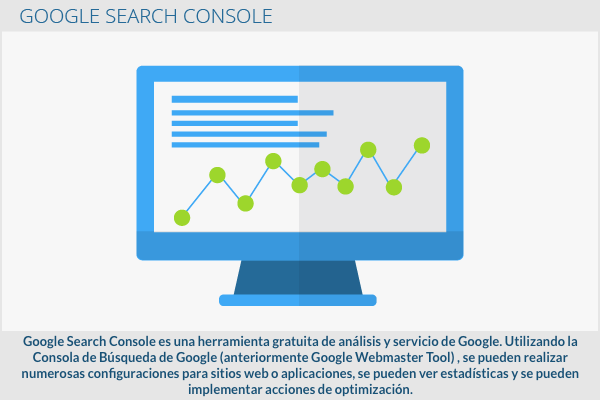Google Search Console es una herramienta gratuita de análisis y servicio de Google. Usando la Consola de Búsqueda de Google (anteriormente Google Webmaster Tool) , se pueden realizar numerosas configuraciones para sitios web o apps, se pueden ver estadísticas y se pueden poner en práctica acciones de optimización. Al mismo tiempo, advierte de la presencia de backlinks no naturales o malware, que se ha instalado en la web. Los datos de la Google Search Console no son públicos totalmente, a diferencia de los datos de Alexa. Las métricas de la Consola de Búsqueda de Google se pueden enlazar con Google Analytics para impulsar los datos.

Contexto
Para Google es muy importante que los sitios web estén sólidamente programados y que el número de errores se mantenga dentro de los límites. Esta intención no sólo es altruista. Por un lado, la empresa Mountain View quiere asegurarse de que sus resultados de búsqueda muestran los objetivos de calidad más altos posibles y, por otro, la optimización de los sitios web es, decididamente, importante para mantener un alto nivel de calidad de las páginas de destino para la promoción comercial mediante de Google AdWords o los sitios web de los editores de Google AdSense.
A la vez, se puede suponer que Google recibe información adicional sobre el diseño y los datos relevantes del portal web mediante de la administración de datos con las Webmaster Tools.
Requerimientos de uso
Para usar la Google Search Console, primero debes registrarse la página en cuestión. Se requiere una cuenta de Google válida. Posteriormente del registro, el propietario debe verificar la página. Existen cuatro métodos distintos recomendados para hacer esto.
Alternativamente, la página web además puede ser verificada mediante de una cuenta válida de Analytics, mediante del nombre de dominio del proveedor, una etiqueta HTML, o el Google Tag Manager. Una vez finalizada la verificación, la herramienta muestra los datos relevantes de esa página web y se pueden usar sus características comunes.
Funciones
La Consola de Búsqueda de Google contiene un gran número de funciones que pueden ser utilizadas para el análisis y optimización de una web. Estas funciones se describen brevemente a continuación:
- Almacenamiento de un mapa de sitio XML: todas las URL de una web pueden transmitirse a Google mediante del mapa de sitio XML. Aún cuando esto no garantiza la indexación futura, existe la oportunidad de que inclusive los items de la página a los que es difícil entrar sigan siendo rastreados. Al mismo tiempo, además puedes configurar un mapa del sitio con imágenes separadas o un mapa en vídeo. La herramienta analiza cada mapa luego de la carga para detectar errores.
- robots. Si se almacena un robot. txt, se puede repasar con la Consola de Google. Nuevas instrucciones para el bot además pueden ser probadas allí.
- Configuración del sitio: Puedes elegir tu país preferido, así como la información sobre el formato de dominio predeterminado deseado (con o sin www) y determinar la velocidad de rastreo (de hasta dos solicitudes de servidor por segundo). Si no conoces el rendimiento de tu servidor, debes dejar que Google realice la configuración automáticamente.
- Desconocimiento de backlinks: Una de las herramientas más discutidas en la escena SEO en los últimos años es la herramienta GWT disavow tool.. Los enlaces entrantes pueden ser declarados inválidos si un webmaster opina que estos enlaces son más perjudiciales que beneficiosos. Muchos SEOs creen que Google usa los datos de esta herramienta para descubrir redes de link. La herramienta se puede hallar aquí
- Ignorar parámetros de URL: SEOs y webmasters pueden utilizar GWT para anular parámetros individuales de una URL. Puedes establecer si el parámetro influye en el contenido o si es, por ejemplo, un parámetro de seguimiento como «utm».
- Eliminación de URL del índice: una característica importante de las Herramientas para webmasters de Google es la eliminación temporal de URL del índice de Google. Esto es útil cuando se listan subpáginas individuales involuntariamente en el índice. Esta función no sustituye la indexación exclusiva mediante de etiquetas como noindex.
- Resaltador de datos: Esta función permite marcar las posiciones relevantes de una página web para que Google pueda identificar información estructurada, como horas de oficina y precios.
Recuperado como por el Googlebot: Con esta herramienta puedes ver un portal web como una araña y descubrir errores de sintaxis. Además es factible renderizar la página absolutamente.
- Enviar URL al índice de Google: Una vez que un portal web se ha recuperado con «Recuperado a partir de Google», se puede enviar de forma directa al índice de Google y a las URL asociadas a él. Puede indexar varias URL al mismo tiempo.
- Control de datos estructurados: cuando un portal web usa microformatos u otros datos estructurados, se puede verificar que un portal web está etiquetado con la Google Console.
- Control de Rich Cards: Si un portal web usa Rich Cards, estos pueden ser comprobados con el GSC.
- Comprobar páginas AMP: Si una página web ha sido implementada como AMP, la implementación puede ser controlada con la Consola de Búsqueda de Google.
- Comprobar la compatibilidad de los dispositivos móviles: el GSC indica si las URL son adecuadas para dispositivos móviles.
- hreflang-Test: Si un portal web dispone de una orientación internacional y tiene varias versiones lingüísticas y de país, se pueden etiquetar con hreflang. La Google Console puede controlar estas etiquetas
- Recursos bloqueados: la Consola de Búsqueda de Google muestra a los usuarios cuando no se pueden cargar recursos importantes en una página web o cuándo impiden la indexación de Googlebot.
Herramientas estadísticas
Al mismo tiempo de las características «activas», la Google Console proporciona una amplia base de datos con estadísticas.
- Panel de control: Los webmasters pueden conseguir una visión general del estado del DNS, errores de rastreo, consultas de búsqueda, la validez del archivo robots.txt y errores en las URL y en el mapa del sitio.
- Búsquedas: Al igual que Google Analytics, la consola además proporciona una visión general de búsquedas, CTR y clics, y clasificaciones de palabras clave individuales. Estas estadísticas se pueden descargar o limitar a un período específico. No obstante, estos datos sólo se mostrarán en las la consola durante 16 meses.
- Enlaces entrantes: la consola proporciona a los usuarios una visión general de los enlaces entrantes que Google ha registrado. A diferencia de las herramientas de vínculos de retroceso de pago, GWT no se arrastran tan profundo y el listado de vínculos de retroceso suele ser más corta.
- Enlaces internos: Google ofrece una visión general útil y muestra cuántos enlaces internos hay desde las subpáginas específicas. Este es un aspecto importante de la optimización de una página.
- Estado de indexación: Muestra cómo se indexó una página web. Esta métrica es muy útil para hallar posibles penalizaciones. La Consola de Búsqueda además muestra cuántas páginas de una web han sido indexadas y qué páginas han sido eliminadas.
- Mejoras HTML: Google ofrece un factible potencial de optimización para meta descripciones y títulos con esta herramienta.
- Error de rastreo: La Consola de Búsqueda informa a los usuarios sobre errores 404 o Soft 404, tanto en la versión de escritorio como en la versión dispositivo móvil.
Notificaciones de Google
Si has registrado tu web en las Herramientas para webmasters de Google, recibirás una notificación de Google si existen problemas con el rastreo. Google además notifica a los webmasters si existen problemas con el servidor o para ciertas actualizaciones de software (como WordPress). Al mismo tiempo informa de cualquier tipo de spam o hacking mediante de la función de problemas de seguridad. Si Google detecta enlaces no naturales o infracciones de derechos de autor, se pueden enviar mensajes a los webmasters mediante del elemento de acción manual.
Otras herramientas web
Originalmente, las nuevas herramientas de análisis se introdujeron como versiones beta mediante de las antiguas Webmaster Tools de Google y pudieron ser probadas por los usuarios. En este momento, la Consola de Búsqueda proporciona enlaces a otras herramientas como el «Reporte de facilidad de uso de anuncios», un comprobador de marcas de email o una herramienta para crear y probar datos estructurados.
Beneficios para SEO
Si el estado de la palabra clave es «not provided», los SEOs pueden usar la consola como un suplemento a Google Analytics. Por lo tanto, se proporcionan datos concretos sobre el acceso mediante de palabras clave. Pero la herramienta además tiene muchas ventajas aparte de esto. Las posibles apps se pueden dividir simplemente en dos niveles:
- Práctica herramienta auxiliar: la console facilita la administración de un portal web para la búsqueda de Google. Los webmasters no necesitan ser expertos en términos de manejo del código fuente o servidor. Un buen ejemplo es la opción de elegir una versión preferida de la web (con o sin www) con la consola. La marca del autoría, por ejemplo, puede configurarse con el Resaltador de datos sin ningún conocimiento de programación para preservar la capacidad de mostrar rich snippets.
Herramienta completa para la optimización: Al guardar el mapa de sitio XML, todas las subpáginas de un dominio se retransmitirán a Google. Las notificaciones sobre errores en el mapa del sitio, o sobre enlaces maliciosos, y el análisis de la meta-información además son útiles.
Si necesitas conseguir siempre las últimas noticias y consejos sobre la Consola de Búsqueda de Google, puede consultarlas regularmente en la Central para webmasters de Google. Posteriormente de registrarte en la Consola de Búsqueda de Google, además puedes suscribirte para recibir cualquier información nueva por email. La función de alerta para «enlaces antinaturales» sacudió la escena de SEO más de una vez en 2012 luego de la actualización de Penguin.
Trivia
Desde el 20 de mayo de 2015, las Webmaster Tools de Google se denominan oficialmente Google Search Console. Una vez que Google obtuvo más información de los usuarios de las Webmaster Tools, descubrieron que sólo algunos de ellos son sencillamente «webmasters». Google ha decidido renombrar este producto para atraer a todos los usuarios que usan la herramienta, como propietarios de pequeñas empresas, usuarios aficionados, SEOs, etc.



